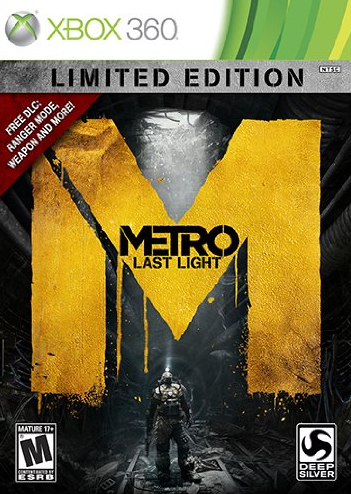 BUY IT FROM AMAZON: RIGHT HERE!
BUY IT FROM AMAZON: RIGHT HERE!
PLATFORM: XBox 360 (reviewed), PS3, PC
PRICE: $59.99
ESRB RATING: M
DEVELOPER: 4A Games
PUBLISHER: Deep Silver
If I could take a magic marker to the universe, I’d get right on changing Metro: Last Light‘s international subtitle to Metro: Here’s Where The Lot Of You Fucked Up. I doubt that correcting the too-common mistakes of triple-A gaming was 4A Studios’ goal, but over the course of 12 harrowing hours, the prevailing thoughts that crosses one’s mind are A: “Oh God, where are those noises coming from”, and B: “Why doesn’t every FPS/survival horror do this?”
That survival horror part is especially prescient, since Last Light joins a depressingly small group of titles that takes the genre name seriously. This is not “Jump scare from the vents, kill it dead” time. Last Light‘s is the true, lasting fear of being completely alone, nigh defenseless, and running low/out of everything in a hostile, unrelentingly ominous world, and that’s just when it’s daylight. Oh, of course, you have a nice assortment of guns, bombs, and blades to play with, a dozen fun variations on them to create at one of the exchange stations, and within 5 minutes of being unleashed for the first time on the post-apocalyptic Russian wastes, you will realize that you are still hideously underequipped. And you will realize it at the worst possible moment, miles from your destination, when all you hear is the howling wind, and hungry, desperate, inhuman panting from not-far-enough-away-to-be-comfortable. And did I mention the part where the surface world is still highly radioactive, and breathing the air for more than a minute will kill you dead unless you wear a mask, a mask whose filters need to be swapped every 5 minutes or so, no matter where you are, what you’re doing, and what’s trying to swipe your head off at that moment?
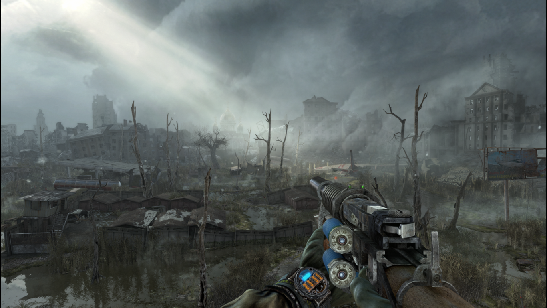 This is the game’s reality, where nuclear war has utterly decimated Mother Russia, forcing its citizens to take permanent shelter in Russia’s extensive subway system, while the surface is overrun by mutants, both human and animal, who are encroaching every further on survivor space. For those just tuning in who never played the game’s predecessor, Metro 2033, you play as Artyom, one of the first children born after the bombs hit. Now 20 years old, Artyom is a soldier defending his station who was tasked with finding a way to kill the mutants before they decide to hit what’s left of humanity first. He wound up finding a disused military facility, D6, with enough firepower to do the deed. The question is raised, however, of whether the mutants are actually plotting to kill us or contact us. For those tuning in who did play 2033, the game operates under the assumption that Artyom didn’t wait long enough to find out, and the “bad” ending is the canon one, whereupon he launched missiles at “The Dark Ones”, completely wiping them out.
This is the game’s reality, where nuclear war has utterly decimated Mother Russia, forcing its citizens to take permanent shelter in Russia’s extensive subway system, while the surface is overrun by mutants, both human and animal, who are encroaching every further on survivor space. For those just tuning in who never played the game’s predecessor, Metro 2033, you play as Artyom, one of the first children born after the bombs hit. Now 20 years old, Artyom is a soldier defending his station who was tasked with finding a way to kill the mutants before they decide to hit what’s left of humanity first. He wound up finding a disused military facility, D6, with enough firepower to do the deed. The question is raised, however, of whether the mutants are actually plotting to kill us or contact us. For those tuning in who did play 2033, the game operates under the assumption that Artyom didn’t wait long enough to find out, and the “bad” ending is the canon one, whereupon he launched missiles at “The Dark Ones”, completely wiping them out.
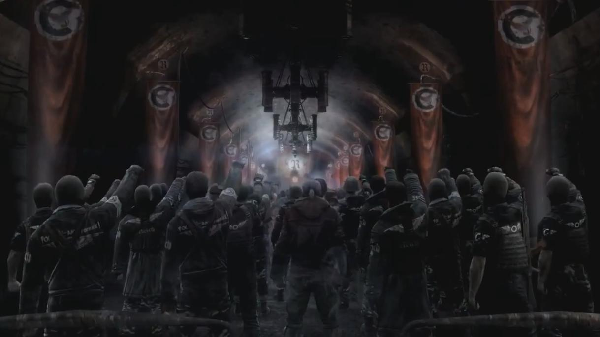 Last Light picks up not long after, where Artyom has regrets about the launch, but is still a well-respected Ranger in his station. A Dark One has survived, a child, and with the realization that there might be more to the mutants than meets the eye comes the government intervention. Three factions have arisen, one just trying to survive, the other two heavily tied to Communist and Nazi dogma, and both have their own ideas how to handle things. So, not only do you have to deal with every trip to another Metro station being fraught with unbreathable air, and life itself coming to ruin Artyom’s shit from the shadows, but the human element of toy soldiers out to prevent Artyom from making any meaningful contact with this new species.
Last Light picks up not long after, where Artyom has regrets about the launch, but is still a well-respected Ranger in his station. A Dark One has survived, a child, and with the realization that there might be more to the mutants than meets the eye comes the government intervention. Three factions have arisen, one just trying to survive, the other two heavily tied to Communist and Nazi dogma, and both have their own ideas how to handle things. So, not only do you have to deal with every trip to another Metro station being fraught with unbreathable air, and life itself coming to ruin Artyom’s shit from the shadows, but the human element of toy soldiers out to prevent Artyom from making any meaningful contact with this new species.
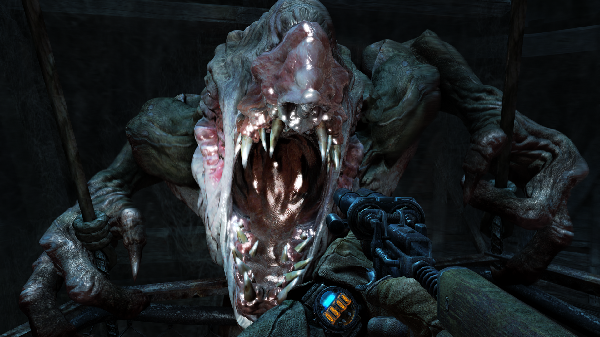 The game has a fascinating juggling act to perform here, keeping the horror and the politics in balance, but it pulls it off, primarily because very early on, the two mix. We are dealing with Nazis and old-school Communism, after all, so going from screeching spiders and irradiated dogs to the Fourth Reich’s dumping room for decomposing prisoners to men in dark rooms being asked to commit genocide in the name of what’s left of country is just the way of things. It is oppressively bleak, but in an earned, believable, immersive way, not entirely predicated on cutscenes to do the heavy lifting, though the ones that are here are out for blood. At their best, it’s playable sequences that are simply in your way, like a simple ammo room that just happens to have black, shadowy ghosts fading in and out of the ether or a corridor of screaming banshees, arms outstretched, melted into the ground itself, to a ghostly flashback to a plane in the sky when the missiles hit that’s as heart attack-inducing as the worst parts of United 93. Regardless, these scenes make no blatant pleas to the emotions outside of how we interpret the cold facts. Still, the world itself has plenty of its own story to tell, little tales to overhear around every corner, tiny details that you might never have caught unless looking at something just right, at the right time, and that story is progressively more frightening and sad as the game moves on, and the game very deliberately doesn’t stop gameplay dead in order to do so.
The game has a fascinating juggling act to perform here, keeping the horror and the politics in balance, but it pulls it off, primarily because very early on, the two mix. We are dealing with Nazis and old-school Communism, after all, so going from screeching spiders and irradiated dogs to the Fourth Reich’s dumping room for decomposing prisoners to men in dark rooms being asked to commit genocide in the name of what’s left of country is just the way of things. It is oppressively bleak, but in an earned, believable, immersive way, not entirely predicated on cutscenes to do the heavy lifting, though the ones that are here are out for blood. At their best, it’s playable sequences that are simply in your way, like a simple ammo room that just happens to have black, shadowy ghosts fading in and out of the ether or a corridor of screaming banshees, arms outstretched, melted into the ground itself, to a ghostly flashback to a plane in the sky when the missiles hit that’s as heart attack-inducing as the worst parts of United 93. Regardless, these scenes make no blatant pleas to the emotions outside of how we interpret the cold facts. Still, the world itself has plenty of its own story to tell, little tales to overhear around every corner, tiny details that you might never have caught unless looking at something just right, at the right time, and that story is progressively more frightening and sad as the game moves on, and the game very deliberately doesn’t stop gameplay dead in order to do so.
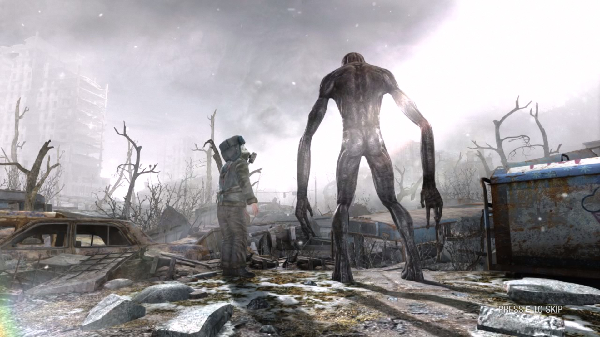 Having said that, there is one cliche the game falls victim to that does, and it’s the hand-holding principle, where at multiple points another character is out in front, and you’re basically being led around by the nose. Granted, the game takes the opportunity to develop characters, or further the story, and there’s a late-in-the-game exception that knows exactly when to get out of your way to let you do your thing, but the best parts of the game leave the player either in wide open spaces, the kind Crysis used to absolutely excel at, or in rail stations with half a dozen little branching paths. The linearity of it all does the game is done no favors by limiting the player’s field of view.
Having said that, there is one cliche the game falls victim to that does, and it’s the hand-holding principle, where at multiple points another character is out in front, and you’re basically being led around by the nose. Granted, the game takes the opportunity to develop characters, or further the story, and there’s a late-in-the-game exception that knows exactly when to get out of your way to let you do your thing, but the best parts of the game leave the player either in wide open spaces, the kind Crysis used to absolutely excel at, or in rail stations with half a dozen little branching paths. The linearity of it all does the game is done no favors by limiting the player’s field of view.
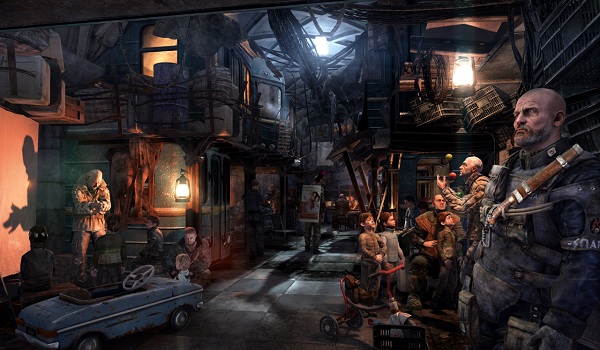 This is all in service of a tale that is not perfect by any means–the climax feels quite rushed, it’s got the same problem with women as love interests or strippers as a lot of games, and with a few exceptions, characters duck in and out of the scene so fast, they blend together–but one that is far more haunting and lasting than 90% of the games in its genre. Other games have mistaken surprise with dread, brown color schemes with grim, empty with desolate, and ideas with intelligence. Metro: Last Light is that one in ten thousand game that doesn’t make that mistake.
This is all in service of a tale that is not perfect by any means–the climax feels quite rushed, it’s got the same problem with women as love interests or strippers as a lot of games, and with a few exceptions, characters duck in and out of the scene so fast, they blend together–but one that is far more haunting and lasting than 90% of the games in its genre. Other games have mistaken surprise with dread, brown color schemes with grim, empty with desolate, and ideas with intelligence. Metro: Last Light is that one in ten thousand game that doesn’t make that mistake.
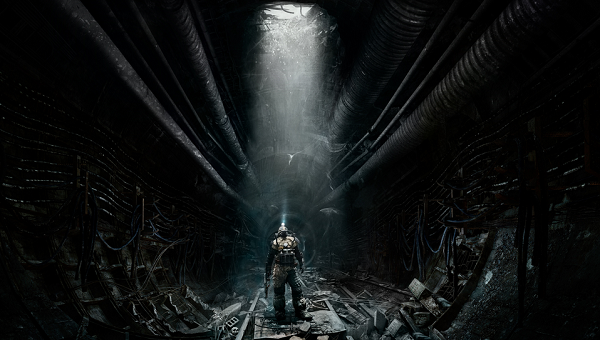




Out Of 5
